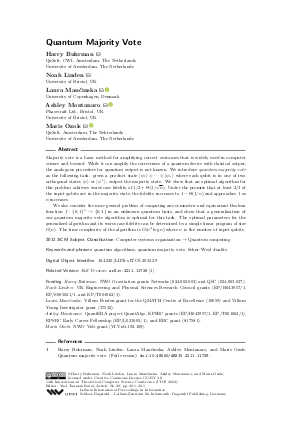Quantum Majority Vote
Authors
Harry Buhrman,
Noah Linden,
Laura Mančinska  ,
Ashley Montanaro
,
Ashley Montanaro  ,
Maris Ozols
,
Maris Ozols 
-
Part of:
Volume:
14th Innovations in Theoretical Computer Science Conference (ITCS 2023)
Part of: Series: Leibniz International Proceedings in Informatics (LIPIcs)
Part of: Conference: Innovations in Theoretical Computer Science Conference (ITCS) - License:
 Creative Commons Attribution 4.0 International license
Creative Commons Attribution 4.0 International license
- Publication Date: 2023-02-01
File

PDF
LIPIcs.ITCS.2023.29.pdf
- Filesize: 403 kB
- 1 pages
Document Identifiers
Related Versions
- Full Version https://arxiv.org/abs/2211.11729
Subject Classification
ACM Subject Classification
- Computer systems organization → Quantum computing
Keywords
- quantum algorithms
- quantum majority vote
- Schur-Weyl duality
Metrics
- Access Statistics
-
Total Accesses (updated on a weekly basis)
0Document
0Metadata
Abstract
Majority vote is a basic method for amplifying correct outcomes that is widely used in computer science and beyond. While it can amplify the correctness of a quantum device with classical output, the analogous procedure for quantum output is not known. We introduce quantum majority vote as the following task: given a product state |ψ_1⟩ ⊗ … ⊗ |ψ_n⟩ where each qubit is in one of two orthogonal states |ψ⟩ or |ψ^⟂⟩, output the majority state. We show that an optimal algorithm for this problem achieves worst-case fidelity of 1/2 + Θ(1/√n). Under the promise that at least 2/3 of the input qubits are in the majority state, the fidelity increases to 1 - Θ(1/n) and approaches 1 as n increases.
We also consider the more general problem of computing any symmetric and equivariant Boolean function f: {0,1}ⁿ → {0,1} in an unknown quantum basis, and show that a generalization of our quantum majority vote algorithm is optimal for this task. The optimal parameters for the generalized algorithm and its worst-case fidelity can be determined by a simple linear program of size O(n). The time complexity of the algorithm is O(n⁴ log n) where n is the number of input qubits.
Cite As Get BibTex
Harry Buhrman, Noah Linden, Laura Mančinska, Ashley Montanaro, and Maris Ozols. Quantum Majority Vote. In 14th Innovations in Theoretical Computer Science Conference (ITCS 2023). Leibniz International Proceedings in Informatics (LIPIcs), Volume 251, p. 29:1, Schloss Dagstuhl – Leibniz-Zentrum für Informatik (2023)
https://doi.org/10.4230/LIPIcs.ITCS.2023.29
BibTex
@InProceedings{buhrman_et_al:LIPIcs.ITCS.2023.29,
author = {Buhrman, Harry and Linden, Noah and Man\v{c}inska, Laura and Montanaro, Ashley and Ozols, Maris},
title = {{Quantum Majority Vote}},
booktitle = {14th Innovations in Theoretical Computer Science Conference (ITCS 2023)},
pages = {29:1--29:1},
series = {Leibniz International Proceedings in Informatics (LIPIcs)},
ISBN = {978-3-95977-263-1},
ISSN = {1868-8969},
year = {2023},
volume = {251},
editor = {Tauman Kalai, Yael},
publisher = {Schloss Dagstuhl -- Leibniz-Zentrum f{\"u}r Informatik},
address = {Dagstuhl, Germany},
URL = {https://drops.dagstuhl.de/entities/document/10.4230/LIPIcs.ITCS.2023.29},
URN = {urn:nbn:de:0030-drops-175321},
doi = {10.4230/LIPIcs.ITCS.2023.29},
annote = {Keywords: quantum algorithms, quantum majority vote, Schur-Weyl duality}
}
Author Details
Funding
- Buhrman, Harry: NWO Gravitation grants Networks (024.002.003) and QSC (024.003.037).
- Linden, Noah: UK Engineering and Physical Sciences Research Council grants (EP/R043957/1, EP/S005021/1, and EP/T001062/1).
- Mančinska, Laura: Villum Fonden grant for the QMATH Centre of Excellence (10059) and Villum Young Investigator grant (37532).
- Montanaro, Ashley: QuantERA project QuantAlgo, EPSRC grants (EP/R043957/1, EP/T001062/1), EPSRC Early Career Fellowship (EP/L021005/1), and ERC grant (817581).
- Ozols, Maris: NWO Vidi grant (VI.Vidi.192.109).
References
- Harry Buhrman, Noah Linden, Laura Mančinska, Ashley Montanaro, and Maris Ozols. Quantum majority vote. (Full version). URL: https://doi.org/10.48550/ARXIV.2211.11729.
